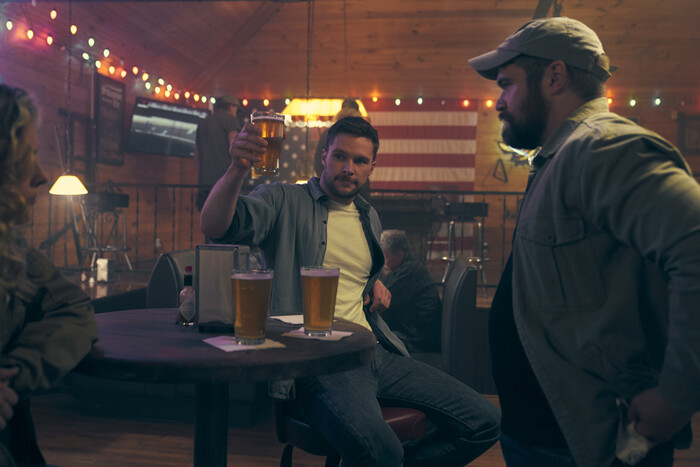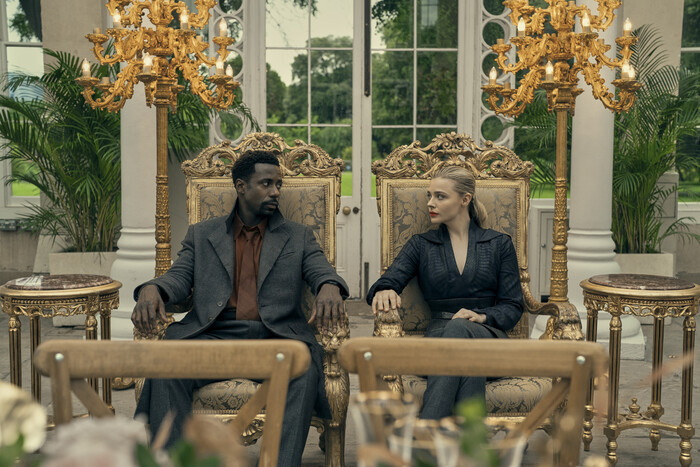Scott B. Smith began writing the Amazon Prime Video sci-fi series The Peripheral three weeks before the COVID-19 pandemic put much of the world into lockdown. A global pandemic plays a pivotal role in the series based on William Gibson’s 2014 novel of the same name, making the experience of adapting the work “almost like watching the book unfold in real time as we’re trying to write,” Smith tells TIME ahead of the show’s Oct. 21 premiere. Gibson, who coined the term “cyberspace” in his 1982 short story Burning Chrome, is regarded as a visionary among sci-fi authors, known for an ability to predict the future. For Scott, it felt as if Gibson had done it again. “I have so much respect for Gibson and his ability to kind of inhabit that near future, it’s extraordinary,” he says. It’s why the creator didn’t want the futuristic series, produced by Westworld creators Jonathan Nolan and Lisa Joy, to stray too far from its source material.
The Peripheral follows Flynne Fisher (played by Chloë Grace Moretz), a struggling gamer-for-hire who lives in the rural American South of the not-so-distant future. After witnessing a murder while playing a mysterious virtual reality game set in London in the 22nd century, she realizes everything she’s been experiencing while wearing the VR headset is real. With help from her brother Burton (Jack Reynor), she embarks on a dangerous journey to save the world from a menacing force that is out to destroy humanity.
The twisty sci-fi noir looks at a future in which reality and virtual reality are one in the same, but, in real life, the now 74-year-old Gibson is actually quite averse to technology. “I would expect him to have a hologram of himself,” Scott says. “He obviously knows so much and observes people interacting with tech, but he’s not the guy you think.” Gibson is a sci-fi writer who is more interested in the way humans choose to interact with technology rather than using the technology itself.
Below, Scott discusses how he paid tribute to Gibson with his small screen adaptation of The Peripheral.
Keep it simple, even when the story gets complicated

The first sentence of The Peripheral is a bit of a head scratcher: “They didn’t think Flynne’s brother had PTSD, but that sometimes the haptics glitched him.” The “haptics” refer to an implant that Flynne’s former soldier brother, Burton, was given while serving in an elite military force, which allows him to sync up with his fellow soldiers. (In the show, Burton describes it as “two souls becoming one” and this connection can often feel a lot like love.) But Gibson doesn’t reveal what the haptics are until later in the novel and he doesn’t do it all at once. He forces his readers to follow his trail of context clues in hopes they will make sense of it on their own.
“I have a friend who says that Gibson’s attitude toward the reader is ‘hold your own f-cking hand,’” Smith says jokingly. But Gibson’s respect for the reader’s intelligence is what the screenwriter loves most about him. “His treatment of sci-fi is very naturalistic,” says Smith, who got his start as a novelist. “He doesn’t define these words or concepts because the people [in his book] don’t need them to be defined.” In other words, this is their world, and we’re the ones visiting, so Gibson asks that you kindly keep up.
Patience is key when watching the series as well. The opening episodes of The Peripheral lack the usual exposition dumps that are common in highbrow sci-fi. “I allowed for a certain degree of confusion and trusted that other people involved in the elaborate production would speak up if anything was incomprehensible,” Scott says. However, he knows asking a reader to figure it out on their own is a risk; viewers who haven’t read Gibson’s novel might feel so out of the loop that they just turn the show off. But it was one he was willing to take thanks to a piece of advice his producers, Nolan and Joy, gave him early in the writing process: “Keep it simple, it’s easier to convey and it’s always enough.” In other words, the viewer’s imagination is more than capable of filling in the blanks—so why not let them?
Scott found that note especially helpful when he was writing the scene in which Flynne puts on the high-tech virtual reality headset for the first time. Before she’s whisked off to London in the 22nd century, Scott knew that fans would want to know what exactly happens when she connects to this immersive technology. Instead of writing up an instruction manual for Flynne to read aloud to explain this futuristic tech, he asked Moretz to show, not tell what it would be like to plug into this sensory experience. “She shuts her eyes, she counts to ten, she opens her eyes and boom,” Scott says. “Flynne is now somewhere else entirely and the viewer just flows right through her.”
Read More: 8 Science Fiction and Fantasy Books That Deserve a Screen Adaptation
What would Damon Lindelof do?
The Peripheral is based on Gibson’s novel, but Smith took a page from Damon Lindelof’s playbook when writing the series. The creator of Lost, The Leftovers, and The Watchmen has an “uncanny ability for creating quirky, unusual characters that fans love,” Scott says. (And, in some cases, love to hate.) “Damon uses that sci-fi space to really allow those characters to become their weird selves.” In fact, Scott thinks lovable weirdos were too rare in sci-fi until Gibson’s 1984 novel Neuromancer, which follows washed-up hacker Henry Case and mercenary Molly Millions. “Traditional sci-fi can be very cold and the characters are almost props there to convey whatever concepts are being expressed,” Scott says. But Gibson’s characters always felt like real people who could have existed at any time in history. That timelessness “was the key and what drew me to the world of Gibson,” Smith says. “He is so prescient, so known for his ability to get the future right, it obscures some of his astonishing capacity as a novelist.”
The series, like the book, focuses on brother and sister duo Flynne and Burton, who are struggling to make ends meet and care for their cancer-stricken mother in near post-apocalyptic Appalachia. Knowing their plight, it’s not hard to understand why they would risk it all for a game. Smith was told that Flynne and Burton’s hometown of Clanton “bears some emotional resonance with Gibson,” who grew up in a small Virginia town in the Appalachians. “I think you can feel Gibson’s connection to this place in the book,” Smith says. “There’s a warmth there. You can’t help but root for these people.” He was able to bring that same warmth to the series thanks to The Peripheral’s stars Moretz and Reynor, who “immediately became almost a sibling pair offscreen, too.” The pair’s easy familiarity with one another is what helps sell this bond between the brother and sister. “There’s so much love between them, but it’s expressed sometimes through giving each other sh-t,” he says. What siblings couldn’t relate.
Creating a future that is more hopeful than dystopian

Despite being written nearly a decade ago, in many ways, The Peripheral feels more prescient than ever. “All of Gibson’s work shows how tech enables and expands connection, but also shows the way it can imprison or subjugate us,” Scott says. It’s a timely concern for anyone who has read the reports on how social media affects the human brain. Gibson’s warnings of a future in which humans become more like robots felt even more dire as Scott was writing the series. Often he and his writers room would share links to stories about Elon Musk’s forays into “brain chips” and Humanoid robot assistants. Both are present in Gibson’s novel in the form of the “haptics” implants Burton was given while in the military and omnipresent ceramic robots called Michikoids that can quickly turn into killing machines. The Peripheral started to feel “all too relevant” Scott says, noting Musk “could be a Gibsonian character.”
These kinds of technological advances that look to make humans more like machines might scare some, but Scott says The Peripheral, both the book and the series, are actually helpful reminders to not give up on humanity just yet. “One of the things we talked a lot about in the writers room was this idea of empathy and how technology can inhibit empathy or enable it,” he says. The reason Flynne is so easy to root for is because she hasn’t lost her compassion for others. She hasn’t gone full cyborg. “That human quality,” Scott says, “is what persists through whatever techno dystopia might be happening on screen or off.” The Peripheral wants to be a friendly reminder of that fact.
More Must-Reads from TIME
- Donald Trump Is TIME's 2024 Person of the Year
- Why We Chose Trump as Person of the Year
- Is Intermittent Fasting Good or Bad for You?
- The 100 Must-Read Books of 2024
- The 20 Best Christmas TV Episodes
- Column: If Optimism Feels Ridiculous Now, Try Hope
- The Future of Climate Action Is Trade Policy
- Merle Bombardieri Is Helping People Make the Baby Decision
Contact us at letters@time.com